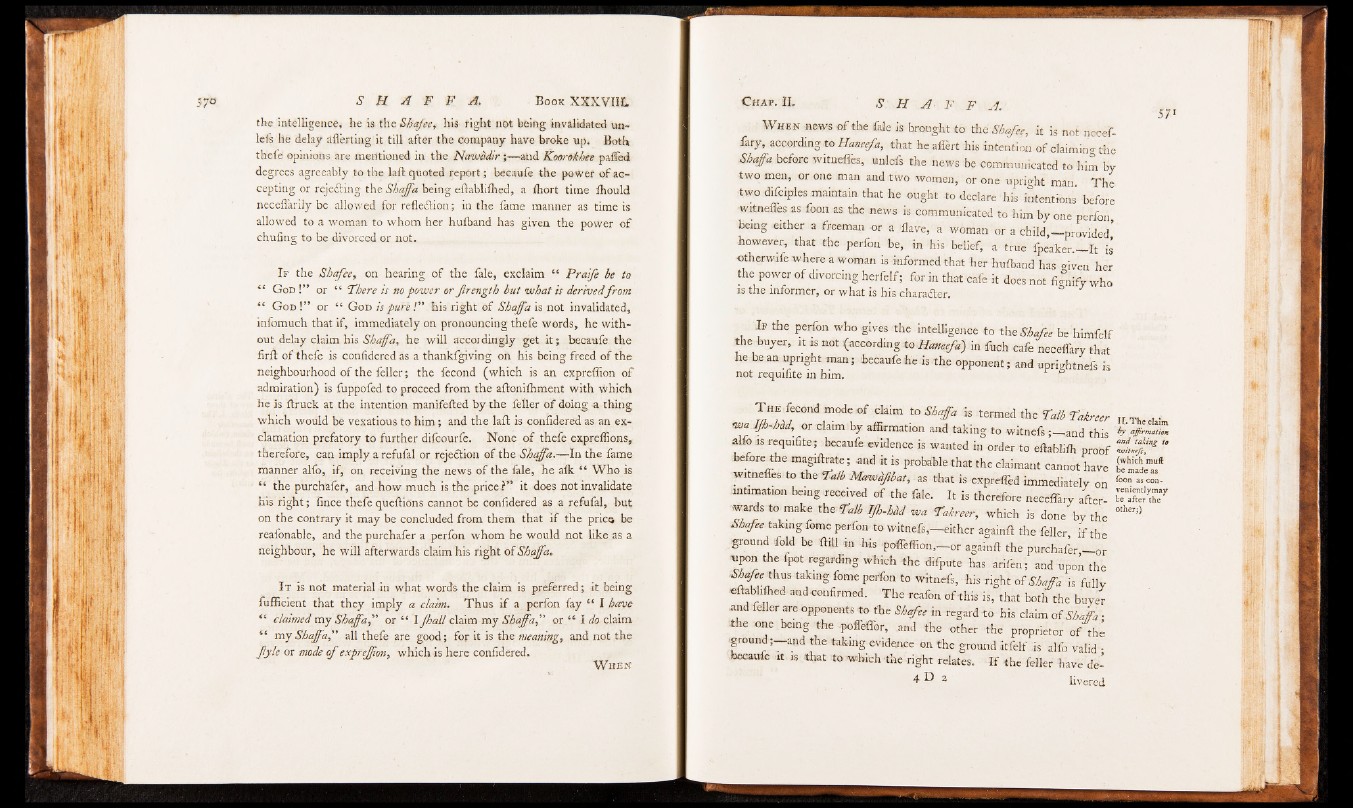
the intelligence, he is the Shafee, his right not being invalidated mile
fs he delay afierting it till after the company have broke up. Both
thefe opinions are mentioned in, the Nawhdir;—and Koorfrkljte pafled
degrees agreeably to the laft quoted report; becaufe the power of accepting
or rejecting the Shaffa being eftablifhed, a Ihort time Ihould
neceflarily be allowed for reflection; in the fame manner as time is
allowed to a woman to whom her hufband has given the power of
chufing to be divorced or not.
I f the Shafee, on hearing of the lale, exclaim “ Praife be to
“ God !” or “ Fhere is no power or flrength but what is derived from
“ God!” or “ God is pure!” his right of Shaffa is not invalidated,
infomuch that if, immediately on pronouncing theie words, he without
delay claim his Shaffa, he will accordingly get i t ; becaufe the
firft of theie is conlidered as a thankfgiving oh his being freed of the
neighbourhood of the feller; the fecond (which is an expreffion of
admiration) is fuppofed to proceed from the aftoniihment with which
he is ftruck at the intention manifefted by the feller of doing a thing
which would be vexatious to him; and the lafl: is conlidered as an exclamation
prefatory to further difcourfe. None of thefe expreffions,
therefore, can imply a refufal or rejection of the Shaffa.—In the fame
manner alfo, if, on receiving the news of the fale, he alk “ Who is
“ the purchalet, and how much is the price ?” it does not invalidate
his right; lince thefe queftiOns cannot be conlidered as a refufal, but
on the contrary it may be concluded from them that if the pries be
reafonable, and the purchafer a perfon whom he would not like as a
neighbour, he will afterwards claim his right of Shaffa.
I t is not material in what words the claim is preferred; it being
fufficient that they imply a claim. Thus if a perfon fay “ I have
“ clatmed my Shaffa,” or “ I Jhall claim my S h a f f a or “ I do claim
fl my Shaffa," all thefe are good; for it is the meaning, and not the
Jlyle or mode o f expreffion, which is here confidered.
W h e n
W h e n news of the Me is brought to the Shafee, it is not necef-
fary, according to Haneffa, that keaflbrt his intention of claimin-the
Shaffa before witnefles, unlefs the news he communicated to him by
two men, or one man and two women, or one upright man. The
two difciples maintain that he ought to declare ■ his intentions before
witnefles as foon as. the news is communicated to him by one perfon
bemg either a freeman or a dave, a woman or a child,— provided’
however, that the perfon he, in his belief, a true fpeaker.— It is
otherwife where a woman is «formed that her hulband has given her
the power o f divorcing herfelf; for in that cafe it does not fignify who
is the informer, or what is his charadter.
I f the perfon who gives the intelligence to the Shafee be himfelf
the buyer, it is not (according to llaneefa) in fuch cafe neceflary that
he be an upright man; hecaufehe is the opponent; and uprightnefs is
not requihte m him.
T he fecond mode of claim to Shaffa is termed the Falb Fakreer
wa Ifh-hM, or claim by affirmation and taking to wknefe ;_ a n d this
alfo is Tequifite? becaufe «ridence is wanted in order to eflablifh proof
heforethe magiffiate; and it is-probable that the claimant cannot have
witnefles to the Falb Marwdfibat, -as that is -expreffed immediately on
intimation being .received of the fale. It is therefore needffary afterwards
to make the Falb IJh-had wa Fahreer, which is done by the
Shafee taking,feme perfon to witnefs,— either againfl the feller, if the
.ground fold be f t i l l -hi s pofleffion,—or againfl the purchafer —or
upon the fpot regarding which the difpute has arii'en ; and vpon the
.Shafee thus taking, forne perfon to witnefs, -his right of Shaffa is fully
eflablrfhed and-confirmed. The reafon of-this is, that both the buyer
and fdler are-opponents to- the Shffee in regard to his claim of Shaffa •
•the one being the -poffeTor, .and -the -other the proprietor of the
ground;— and the taking evidence on the ground itfelf is alfo valid •
becaufe it is that to which the -right relates. I f the feller have de-
4-D 2 livered
11. T h e claim
by affirmation
a n d taking to
nuitnefs,
(which muft
be made as
foon as convenient!
y may
be after the
other;)